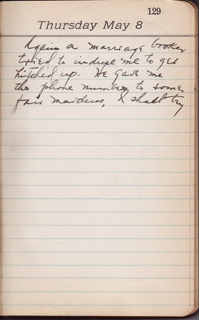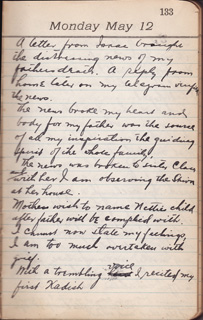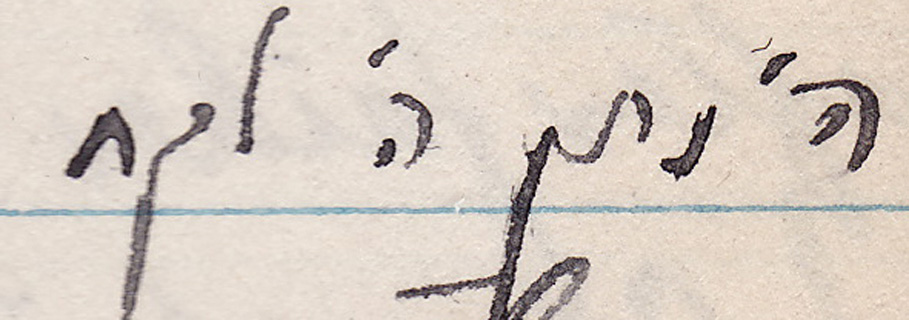
Stopped this morning long enough
to bid Bon Voyage to our leader
Weitzman, The scene was a very
impressive one as the huge ship
moved out slowly.
In evening had Miss B. out
for a bus ride it was pleasant.
—————-
Matt’s Notes
The ship Papa saw off that morning was the Aquitania, the pride of the Cunard line in the early 20th Century (other Cunard ships included the Mauretania and the ill-fated Lusitania). Noted for her great size and opulent interiors, the Aquitania was the last of the “four-stackers” and a favorite among movie stars and aristocrats in the 20’s, so the sight of her leaving New York harbor would have been as impressive as her passenger list.

Among those on board with Chaim Weitzman were Ogden Reid, who had bought the New York Herald to create the Herald-Tribune just six weeks before, and Prince Felix Youssoupoff, flamboyant husband of Princess Irina of Russia, the niece of Russia’s last Tsar, Nicholas II. According to the New York Times, the Prince had been in America to sell off a “large collection of jewelry” while Weizmann “carried with him approximately $5,000,000 raised in the United States for the restoration of Palestine.” It might have been a tad awkward if Youssoupoff and Weizmann ran into each other on the Aquitania, since Youssoupoff had been a key member of Nicholas II’s brutally anti-Semitic court (so much so that he participated in the murder of Rasputin). Hopefully the cruise director sat them at different dinner tables.

Papa, of course, knew not of the Aquitania‘s luxurious dining rooms and lounges, so while his “leader” was sailing to England, Papa contented himself with a social cruise on one of New York City’s buses. We’ve seen romantic episodes unfold for Papa aboard trolleys and trains, so perhaps he thought a bus ride with “Miss B.” on a lovely, 65-degree day would have been just the thing (this is his first mention of her, so I wonder if she’s the woman he met at a Zionist ball a few days before). Was this a typical way for people like Papa to get acquainted? What bus would they have taken?
————–
References
- New York Times article on the Aquitania’s departure
- Aquitania entry at Wikipedia
- Felix Yussupov entry at Wikipedia
———
Image sources:
- Aquitania – Library of Congress #LC-D4-22833
- Illustration of the Aquitania leaving New York Harbor Courtesy J. Kent Layton, www.atlanticliners.com









 is gone.
is gone.

